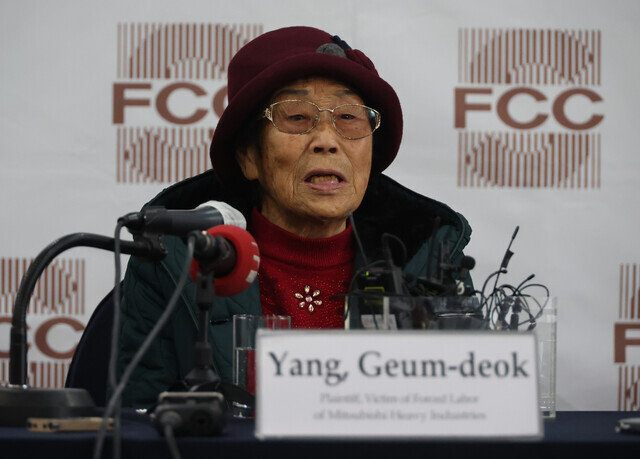hankyoreh
Links to other country sites 다른 나라 사이트 링크
Korea’s forced laborers to continue fight for direct compensation, regardless of Seoul-Tokyo agreement

The legal teams representing victims of Japan’s forced labor mobilization during its colonial occupation of Korea appear to be anticipating a prolonged legal battle over the government’s solution for compensating victims.
Even if a final agreement is reached between the diplomatic authorities of Korea and Japan, the legal battle is expected to continue if the victims do not accept the outcome.
Lim Jae-sung, one of the legal representatives for multiple forced labor victims, stated in a meeting hosted by the Seoul Foreign Correspondents’ Club on Thursday that the legal teams will dispute the legal validity of the so-called “overlapping assumption of obligation” that the government is pushing for through the Foundation for Victims of Forced Mobilization by Imperial Japan (Foundation for Victims).
In an open debate held at the National Assembly on Jan. 12, the government formalized a plan to compensate victims of mobilization with funds raised by the Foundation for Victims instead of demanding that the Japanese companies implicated in the forced labor trade pay the victims directly. The Foundation for Victims will assume the debt of the defendants (offending Japanese companies found liable for compensation under the Supreme Court’s final ruling) and pay compensation to the plaintiffs (victims of forced mobilization) with funds raised through a claims agreement signed by Korea and Japan in 1965.
Lim said that the government is preparing two measures to abolish the plaintiff’s bonds, the first of which involves obtaining the consent of the plaintiffs and encouraging them to sign a memorandum of bond waiver.
“The ‘sincere response’ that the government is demanding from Japan is a measure being taken due to the public opinion in Korea, but it is also a measure to persuade more plaintiffs to sign the bond waiver memorandum,” Lim said.
If victims refuse to give up their bonds, a unilateral deposit method could also be put into action. The Foundation for Victims, which signed a debt acquisition contract with the defendants, could deposit the compensation ordered in the Supreme Court’s final ruling into the court as the debtor and argue that the right to claim redemption of bonds in the plaintiffs’ lawsuit for the forced sale of assets in Korea has expired.
In response, Lim said the team can “legally contest the validity of the deposit submitted in the execution case, specifically the foundation’s debt autonomy,” in essence, the validity of the coexistence debt acquisition contract.
“Despite what both the Korean and Japanese governments expect, the execution case will not be dismissed easily, and auctions over the defendant’s assets in Korea will be launched.” Until now, the government has insisted that carrying out a forced sale of defendants’ assets in Korea will undo Korea-Japan relations.
By Jung In-hwan, staff reporter
Please direct questions or comments to [english@hani.co.kr]

Editorial・opinion
![[Guest essay] Preventing Korean Peninsula from becoming front line of new cold war [Guest essay] Preventing Korean Peninsula from becoming front line of new cold war](https://flexible.img.hani.co.kr/flexible/normal/500/300/imgdb/original/2024/0507/7217150679227807.jpg) [Guest essay] Preventing Korean Peninsula from becoming front line of new cold war
[Guest essay] Preventing Korean Peninsula from becoming front line of new cold war![[Column] The state is back — but is it in business? [Column] The state is back — but is it in business?](https://flexible.img.hani.co.kr/flexible/normal/500/300/imgdb/original/2024/0506/8217149564092725.jpg) [Column] The state is back — but is it in business?
[Column] The state is back — but is it in business?- [Column] Life on our Trisolaris
- [Editorial] Penalties for airing allegations against Korea’s first lady endanger free press
- [Editorial] Yoon must halt procurement of SM-3 interceptor missiles
- [Guest essay] Maybe Korea’s rapid population decline is an opportunity, not a crisis
- [Column] Can Yoon steer diplomacy with Russia, China back on track?
- [Column] Season 2 of special prosecutor probe may be coming to Korea soon
- [Column] Park Geun-hye déjà vu in Yoon Suk-yeol
- [Editorial] New weight of N. Korea’s nuclear threats makes dialogue all the more urgent
Most viewed articles
- 1[Column] Why Korea’s hard right is fated to lose
- 2[Column] The state is back — but is it in business?
- 3Amid US-China clash, Korea must remember its failures in the 19th century, advises scholar
- 460% of young Koreans see no need to have kids after marriage
- 5[Column] Life on our Trisolaris
- 6[Reporter’s notebook] In Min’s world, she’s the artist — and NewJeans is her art
- 7Japan says it’s not pressuring Naver to sell Line, but Korean insiders say otherwise
- 8[Column] Monopoly Power: Is it time to bring back anti-trust?
- 9With 0.4 degrees left until “red line,” are we doing the best we can on climate change?
- 10Dermatology, plastic surgery drove record medical tourism to Korea in 2023